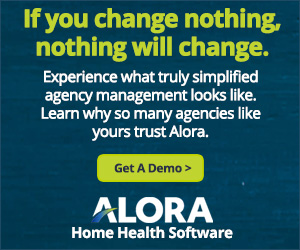
19 Oct Why caregivers quit, and how to keep them happy
Key strategies for home health agencies to retain and grow agency staff
During and after the Covid pandemic, many companies across various industries faced challenges with maintaining a healthy workforce. The healthcare sector, and especially home health care agencies found it difficult to retain their employees. Indeed for the last decade, the struggle to improve home healthcare staff retention has been at the forefront of the industry, with projected caregiver and nurse shortages expected to continue to rise as an aging population’s healthcare needs follow suit.
The media labeled this phenomenon the “Great Resignation.” Workers in almost every industry reported feeling disenchanted with their jobs. Per media reports, more than 50 million people left their jobs in 2022, setting a record for workforce turnover. Nowhere was this disenchantment more visible than in healthcare.
Upon investigation of the data, it’s easy to understand why the home health sector struggles with staff retention. Nurses and caregivers are needed at all hours of the day. Patients do not come and go in regular shifts, nor do they clock out from being a patient. Despite the signs and billboards that read “thanks to our “essential” workers,” our culture gives very little respect or prestige to people in the caring professions. Furthermore, caring for people in pain or near the end of their lives can be emotionally exhausting. These factors make it no mystery as to why the healthcare industry is losing a big chunk of its workforce as employers struggle with retention.
Salary vs Benefits – Some Benefits Are Better Than Pay
Increasing employees’ pay rates might seem like the easiest solution whenever the question of keeping employees happy comes up. That said, every agency may not be able to afford to give a raise to everyone across the board. Now you have the tricky puzzle of figuring out who gets a raise and who doesn’t, and that could bring up issues of fairness and discrimination.
While it is true that wages need to keep up with high inflation, payroll is only one part of the equation. You need to consider the full range of benefits that your employees might desire. There are so many ways you can compensate your employees. Here are some to consider:
- Carpool or company transportation
- Childcare assistance or a stipend
- Company phone or reimbursed phone bill
- Compensation for gas, mileage, and travel time
- Financial education and planning
- Free meals or food-sharing program
- Health savings account (HSA)
- In-office yoga class
- Life insurance
- Mental health resources and support
- Tuition reimbursement
- Retirement savings accounts such as 401(k) or IRA
- Wellness program, free or discounted gym membership
There are others of course, but even a couple of these benefits would demonstrate your commitment to your employees’ long-term happiness and wellbeing.
Never Forget Balance
Countless surveys and interviews continue to support the idea that what most employees value most is work-life balance. That means time — as in, giving people free time away from work. Both federal and state laws mandate that employers grant holidays and sick days, plus a minimum number of Paid Time Off (PTO) hours, but these are only minimum requirements. Nothing prevents you from giving your people even more flex time, either paid or unpaid, to be with their families and recharge their batteries so that they do not burn out.
Everyone Wants Autonomy
The best managers are the ones who trust their employees and give them a measure of independence. Nurses, home health aides, and caregivers are trained professionals, and they deserve to be treated as such. As the owner of the agency, you might feel an urge to micromanage your employees’ every move. Resist that urge! You have neither the time nor the energy to oversee all that work, and besides, nobody likes being monitored constantly.
Of course, your agency must have a structure in place for checking in, reviewing care notes, collecting feedback, and making sure the whole care team is kept up to date on a patient’s condition. While tools like a solid EHR system or home health software can do the heavy lifting with record keeping and process implementation, the human element of interaction and communication still goes a long way in building and fostering trust. The last thing you want is a team that lacks trust, where people are afraid of getting in trouble. Employee performance suffers when they feel like they cannot move about freely or make decisions without asking permission.
People quit jobs where there is a lack of autonomy. Treat your people like professional adults, and they are more likely to continue working with you.
Training Should Be Rewarding, not a Chore
A typical care agency will organize a training event (sometimes called an “in-service”) about once every quarter. Some try for training sessions more frequently. How you approach these regular training courses can influence how employees feel about working for your agency. If you behave as if you don’t really care about this training, or you are only doing this training because it’s required by law, then your employees will feel apathetic too. Not only might they resent the training as a waste of time, but they will also fail to retain the information.
People who are bored, disengaged, or annoyed by their jobs are unlikely to stick around for very long. Take on your training sessions as an opportunity, a chance to strengthen your agency while showing your team that you care. First, you need to come up with new and interesting topics. You should avoid repeating the same topic more than once a year. You can engage with and ask your employees what they would like to learn. What are they most curious about within their jobs?
One of the biggest mistakes that trainers make is to approach their training like a classroom — a bunch of students seated in rows, facing a single teacher at the front. We often forget how uncomfortable school can be, and how many children do not learn in that environment. It’s no different for adults, so experiment, try something different, and make it fun. What if the training session were held outdoors? What if everyone stood up and moved around instead of sitting at a desk? Additionally, you don’t have to assume the lonely role of “teacher.” You can entrust your team with the material, and invite them to share and train each other as a community of learners. Whatever you can do to disrupt their expectations will reduce their boredom and keep them engaged. The more they engage in training, the more rewarding your training will be.
Your Agency’s Culture Starts with You
Regardless of past mistakes, challenges, and other obstacles, you have the power to make your agency the kind of place where people love to work. Pay increases are only a very small factor and not a quick fix. When caregivers enjoy their training, feel empowered to do their jobs, and enjoy benefits that really matter, they will naturally feel more loyal to you and your agency. Happy, engaged caregivers provide a better quality of care, which in turn makes the whole agency more successful, sustainable, and effective.
Author’s Note: Views, information, and guidance in this resource are intended for information only. We are not rendering legal, financial, accounting, medical, or other professional advice. Alora disclaims any liability to any third party and cannot make any guarantee related to the content.
Additional Home Health Agency Staff Retention Reading:
- Five facts about caregiver burnout that will startle you
- Creating magnetic job postings to attract nurses to your agency
- Preventing caregiver turnover in your home health agency
- Ten best ways to show caregiver appreciation
- Dealing with the shortage of caregivers in home healthcare
- Caregiver training – six key practices to get nurses off to a good start
- Work/life balance tips for clinicians

Alora’s home health software solution is ideal for agencies operating in both skilled and non-skilled care. For more than 16 years Alora has simplified workflow for countless agencies, helping them serve nearly 850,000 patients, while fostering growth and efficiency. Building a strong agency culture where caregivers enjoy their work starts with making their job as simple as possible. Alora makes everything involved with day-to day workflow easier, so agencies can thrive with simplicity and focus on patient care.




No Comments